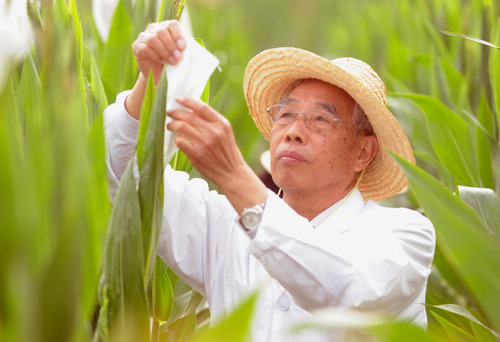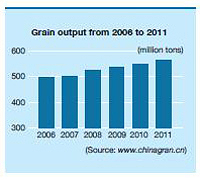|
 |
|
SEED "SILICON VALLEY": Cheng Xiangwen, one of China's leading scientists in corn research, examines new corn species in a breeding base in Hainan Province on January 20, 2011 (LI XIAOGUO) |
"Recently, the Ministry of Agriculture and the Ministry of Technology issued a circular to encourage agricultural science and technology innovation, especially the development of the breeding and seed industry," said Zheng Fengtian, Vice Dean of the School of Agricultural Economics and Rural Development of the Renmin University of China in Beijing.
On April 18, 2011, the State Council issued a document to hasten the development of a modern crop seed industry in China. It clearly defined the strategic position of the seed industry and spelled out specific measures to support seed companies. For instance, it said that internationally competitive companies in the industry should be nurtured through mergers and acquisitions.
On May 9, key leading enterprises in China's seed industry held a meeting in Changsha, Hunan Province. Industry insiders said that the meeting was the most important for the industry in more than 50 years. Premier Wen Jiabao said in a written speech that China is a major agricultural nation, and speeding up the development of the seed industry is a strategic choice to build modern agriculture and ensure national grain security and an important way to boost agriculture through science and technology and shift the agricultural growth model.
In August, the Ministry of Agriculture issued a regulation on crop seed production license management, which increased the threshold for entry into the seed market and encourages seed companies to merge, regroup and cooperate with seed research organizations. The ministry also cracked down on intellectual property rights infringements and cases involving the production or sale of fake or inferior seeds.
The ministry also set up a new department to supervise the quality and security of seeds, including transgenic seeds, in the latter half of 2011.
The government plays a leading role in promoting agricultural science and technology application. It provides discounted loans, grants and capital injections for this purpose. In 2001, the State Council set up the Agricultural Science Technology Achievement Transformation Fund. In the following 10 years, state allocations to the fund totaled 3.15 billion yuan ($485 million).
Despite this, the promotion of new farming techniques is still a headache for the government and agricultural scientists.
"Even though some important progresses in agricultural science and technology have been made, and China's ability to innovate in agriculture has improved in many cases, these achievements have not been put into practice," said Pan of the Ministry of Agriculture.
Official statistics show that every year, nearly 6,000 new techniques in agricultural sectors are approved by provincial- and ministerial-level governments, yet during the period from 2006 to 2010, only about 40 percent of these achievements were put into commercial use.
Some experts blame the situation on the inadequate performance evaluation system in agricultural research institutes, where scientists tend to be judged by the number of projects they have worked on and the papers they have published. As a result, they argue, not enough attention has been paid to the successful commercialization of research results.
In addition, as a large number of rural residents have moved to cities, there are not enough qualified people in the rural areas to apply new science and technology.
Pan said that institutional reform is needed to promote the application of agricultural science and technology.
But, according to Song of CIConsulting, promotion of new farming techniques in remote areas is still a responsibility of the government because for-profit enterprises are unlikely to be interested in it.

E-mail us at: tangyuankai@bjreview.com | 